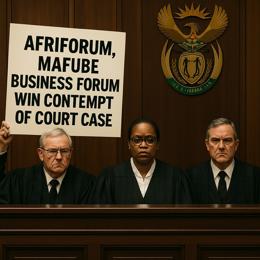Image created by AI
Legal Challenge by Former Public Protector Over Gratuity Raises Eyebrows
In a move that is causing widespread astonishment and criticism, former Public Protector Busisiwe Mkhwebane is legally challenging the denial of a R10-million gratuity following her impeachment for misconduct and incompetence. This has ignited a discourse on the norms of public service and the responsible stewardship of taxpayer money in South Africa.
Mkhwebane was removed from office after a section 194 inquiry found her guilty, marking a significant deviation from the commendable performance of her predecessor, Thuli Madonsela. Madonsela's legacy included turning a marginal office into a robust entity upholding the well-being of South Africans. Conversely, Mkhwebane’s series of legal missteps and misunderstandings starkly contrasted with the expectations of her role as protector and promoter of constitutional democracy.
The boldness of Mkhwebane’s demand for a gratuity has been matched by her attorney, Dali Mpofu SC's controversial defense. Mpofu argued that withholding such a payment would constitute double punishment and offend the value of ubuntu—a principle of compassion and humanity in African philosophy. This particular reference to ubuntu has been met with incredulity, as it seems to misrepresent its core values.
Legal minds have risen to challenge the premise of Mkhwebane’s entitlement. Advocate Tembeka Ngcukaitobi SC, in his representation against Mkhwebane’s claim, referenced her receipt of more than R10-million in legal fee payments from the Office of the Public Protector as a benefit that further weakens her case for a gratuity.
Public opinion seems to converge on the idea that rewarding misconduct, particularly when public resources are at stake, should not be the standard. Thus, Mkhwebane’s legal battle over the gratuity is not merely about the sum of money but ultimately concerns the principles of accountability and justice within the public sector.
The persistent legal feud has also raised concerns over the unnecessary allocation of state resources to this cause—funds that could potentially serve more pressing needs within the community. The entwinement of public crusades with personal gains poses troubling questions about the integrity of individuals in high office and the broader implications for governance.
Mkhwebane's legal undertaking is now set against a backdrop that includes substantial public expenditure on her behalf, an impeachment declarative of her failure to uphold her office's responsibilities, and an ethical conundrum about compensating public servants post-dismissal.
As such, this saga has become a touchstone for evaluating the expectations South African society places on its public officials and the governance of financial rewards within the public domain.










